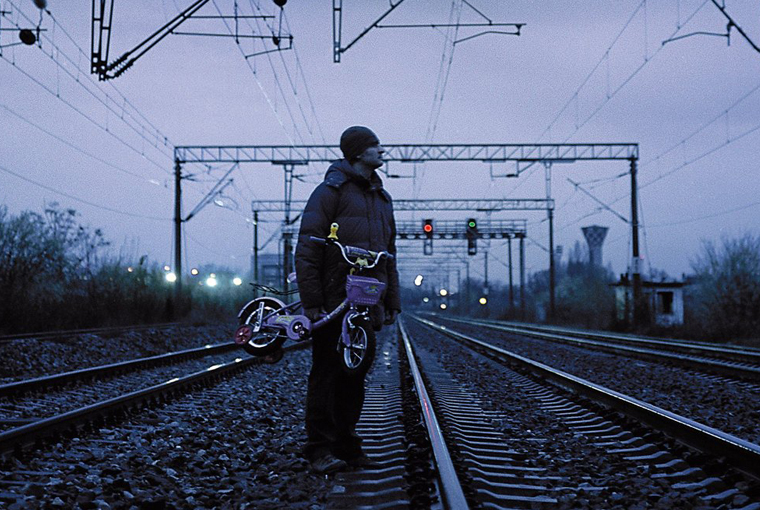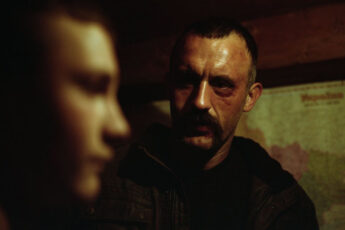
Aurora, Cristi Puiu’s latest feature film, has caused vast disagreement among viewers and critics about its equivocal style and purpose, ultimately leading to the film’s struggles to pick up distribution. After Stuff and Dough from 2001 that is considered the first film of the Romanian New Wave, and The Death of Mr. Lăzărescu (2005), the first film from the Romanian New Wave that had international success by winning the Un Certain Regard prize in Cannes, Aurora is Puiu’s first film that returned from its premiere on the Croisette backed with little to no enthusiasm. Though Puiu’s three films ascend with regard to their running time, they are simultaneously radically decreasing in action.1 While Puiu’s gripping debut Stuff and Dough about two young men who try to deliver a dubious package to Bucharest might be as close as a Romanian film has ever gotten to an American-style action film, little happens on screen during the 3 admittedly tiring hours that Aurora spans, with most of its screen time dedicated to every-day activities like showering, eating and driving, and Viorel’s preparations for the 4 murders he will commit in the course of the film.
Why, one may ask, does Puiu waste 3 hours on introducing Viorel, the protagonist, when at the end of the film we seem to know as little about him as at the very beginning?2 Puiu wants to give the viewer insight into the mind of Viorel, into the way a murderer approaches a murder. The film spans over 180 minutes because it literally takes time to get accustomed to the rhythm of Viorel, to the way his mind works.3 Although Viorel is a character much can be said about, in this essay, I will mainly try to answer the question whether Puiu’s realist approach to his agenda is justified.4 In the end, the discussion about Aurora’s style should give insight into both why the film is shot the way it is, and what it is about.
The film opens upon sunrise in the apartment of Gina, a woman whom Viorel sees regularly for sex. At breakfast, Gina starts telling Viorel that her daughter had challenged the tale of the red ridinghood in class. Since the wolf had stolen the clothes of the grandmother, Gina’s daughter had concluded that the grandmother must have been naked when the hunter took her out from the wolf’s stomach. Viorel, who doesn’t detect Gina’s intention of simply pointing out her daughter’s attentives, responds saying “She is right.” Of course, only a child fails to understand that a fairytale does not follow the logics of the real world, but as we soon realise, Viorel, too, has issues putting certain things into context. Much of the film – in a sense, even the murders – focuses on Viorel’s stubborn attempt to enforce order in his environment, a logical system that he can relate to. It is no surprise, then, that his murders are all linked to his divorce. Viorel needs predictability, and people who do not act according to this simple condition immediately fall victim to his judgement. When one of his co-workers fails to return money to Viorel on time, he persistently confronts him even after having received it.5 Many sequences are dedicated to what Manohla Dargis (New York Times) calls these “oddly funny, touching exchanges that waver between the ridiculous and the tragic,” Viorel attracting most of the camera’s attention. Even as Viorel starts murdering his victims, the pace of the film remains the same…
Principally, a problem in drawing a realist conclusion from Aurora seems to be the fact that it is such a subjective film. Of course, with regard to earlier cinema, one could retort that Italian Neo-Realism was subjective, too. Instead of the blinded, idealist perspective of European and American war-time (mainstream) cinema, the Neo-Realists turned to the individual voices of the proletariat. But here, the seemingly individualist scope was always exemplary, always representing the fate of the system as a whole (and ultimately serving an ideological statement). Is Viorel exemplary, then? It is arguable, and Puiu does not give a clear answer to this question himself. On the one hand, the film plays with the notion of Post-Communist individualism,6 on the other hand, critics were inclined to ascribing an autistic condition to Viorel. It seems to me, however, that whatever interpretation one subscribes to, the question of realism remains. Either way, Aurora is still subjective in a different way than a film like De Sica’s The Bicycle Thief, because in Puiu’s piece there is no direct causality between society and Viorel’s actions. In The Bicycle Thief, Sica constructs the story so that the theft of the bicycle is the only possible way out for Ricci and his family. Indeed, from his perspective the theft seems fair and justified. In Aurora, on the other hand, at no time does the audience believe that Viorel’s actions are obligatory. Indeed, it is wrong to think that the Romanian New Wave makes a black-and-white verdict of a system. In films like Corneliu Porumboiu’s 12.08 East of Bucharest, Cristian Mungiu’s 4 Months, 3 Weeks, 2 Days or Puiu’s The Death of Mr. Lăzărescu, there is no one-way explanation of the nature of the problem.7 Another notable parallel between Aurora and other Romanian New Wave is the question of communication and language, respectively its non-existence. The system exploits the protagonists of the film, but their condition is equally due to their own actions (of course, as Corneliu Porumboiu shows in 12:08 East of Bucharest, people do not necessarily admit to the affiliation with the disfunctionality of the system). This approach seems more objective than that of the ideologically guided Neo-Realists in Italy, because in the Romanian films, the entire world is based on the rhetorics of the system (whereas in the Neo-Realist films, it is the individual falling victim to the whole). Dante Remus Lăzărescu is just as much part of the system as the doctors who fail to treat him. Although in the end Viorel subjects himself to the system, too (willingly, because in a world that follows order, he must follow that order, too), there is no reversal logic. The film is only told from the perspective of Viorel, in fact he is even the only one making decisive decisions in this film (even the arrest is practically conducted by himself). Aurora never switches to the perspective of the other characters, it never allows us to detach from Viorel, which not only seperates the film from Sicca and the Neo-Realists, but even the Romanian New Wave of which he is said to be part of. It is this point that Puiu also criticises in Hitchcock’s Psycho: the viewer expects a demonisation of the protagonist as an explanation for his crimes, and, worse, is granted one. Hitchcock deconstructs Norman Bates for the audience, a notion that Puiu categorically negates. Of course, Aurora, too, ends at the police station, but it is only to allow Viorel to explain the motives for his crimes, not to lay open his character.8
In our interview with Puiu, he told us that he acted himself in the film (thus making his acting debut) because he claims that he wouldn’t have been able to give directions for a role that he doesn’t fully understand himself. Of course, one could ask, then, where Puiu sees the audience in this film. If Puiu cannot even convey his idea to an actor, how can he convey it to an audience? At first sight, it might seem as if Puiu was simply attempting to minimize the distortion of reality through representation, but the result is not consistency with reality. Puiu seeks to make the film as internal as possible. As soon as Puiu would put Viorel’s character into words (and an actor would begin to interpret the role), Viorel would be deconstructed, because the verbal externalisation demands an assessment of the character. Psychological formulas are precisely what Puiu is trying to counter. The film is lengthy and repetitive because that is the way that Viorel works. Puiu believes that by avoiding explanation, he can internalise Viorel without having to approach him analytically.9 Puiu claims that especially in cases like Aurora, an objective examination won’t tell us anything.
In his essays on the nature of cinema, Andre Bazin states that compared to the other arts, the cinema is so different, and in a sense more pure, precisely because the input of the human is so small. It is in the camera, a machine, that the piece of work is conceived, not through the hands of an artist (Bazin; p. 13). Yet, I believe that this notion is to be taken relatively.10 Bazin has no intention of claiming that the director has no control over the camera work, and Puiu agrees with this view even with regard to a film like Aurora:
The camera can’t be stupid. It’s not just an artificial recording device. There’s a human being observing. Cinema is an instrument for investigating the real, for investigating life. OK, so there’s another question that arises, which is: why fiction films? It’s because fictions come from our minds. And so they’re like evidence—evidence of a certain way of thinking about the world. The camera isn’t moving accidentally; there’s an intention. (FilmQuarterly Vol. 64 No. 2, Cristi Puiu discusses Aurora)11
Even if Arnheim, whom Puiu himself references frequently, and Bazin seem to disagree on the idea of cinema as a mechanical reproduction of reality, they share a similar view on the point that Puiu is bringing up: that the camera fulfills the intentions of the director. In this sense, it is a very superficial reality that – in a weak reading – Arnheim and Bazin presuppose in cinema, namely the fact that the camera always captures what is factually in front of the lens, whereas a painting can be completely detached from its setting. Puiu stresses this point because he thinks that the distortion of reality is an inevitable consequence of making a flm. Indeed, realism has its boundaries in reconstructing reality, but to a certain extent, this is what makes film an art form in the eyes of Arnheim:
The pictured space is visible to a certain extent, but then comes the edge which cuts off what lies beyond. […] It is just such restrictions which give film its right to be called art. (Arnheim; p. 17)
Aurora does not show us the way that the world is, but the way that it is perceived by an individual (regardless of the fact whether we see Viorel as an exemplary perspective or not). Even if it seems that Puiu is addressing a fundmantal issue with his postulations, indeed, the very structure of cinema, in a sense, is unrealistic. As Hitchcock states, “drama is life with the dull bits cut out”. The Romanian New Wave, and Puiu, in a more radical manner, reject the staging that cinema employs.12
Nevertheless, the camera work remains hard to grasp. On the one hand, Viorel is at the center of the action, on the other hand, there are a few moments when we are not strictly viewing upon the action from his perspective. A scene that seems to break with the subjective style of the film (and was rightfully adreesed in most critiques) is the one where Viorel kills his ex-wife Mrs. Livinski. After a fairly ordinary conversation between the two at Mrs. Livinski’s house, Viorel follows her upstairs and assaults her. The audience – half-awaiting this event – remains downstairs as the camera latches onto the tubes covering the ceiling of the living room, the voices and sounds taking over for the images. There are yet other moments when the camera remains behind a window or a door, and even the sounds are cut out. But isn’t Puiu simply reminding us of the limits of cinema? No matter what our approach may be, it is only an approximation to reality that never reaches the factuality of the original. In my opinion, Puiu’s film is an advance in realist cinema not because he employs a new realist language, but because he realises that a formal modification will not solve the constitutive friction of an art work with reality. Many realist directors fail to realise that the attempt of cinema to put reality into fiction defies the very nature of film. In a sense, these directors are as naive as Viorel who tries to enforce reality in a fairytale. For Puiu, cinema must represent, not reproduce.13 We converge reality by complying to its deep structure, not its surface form. It seems, then, that Aurora is as realist as cinema can get.




Leave a Comment